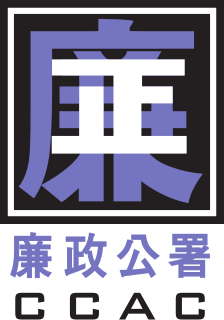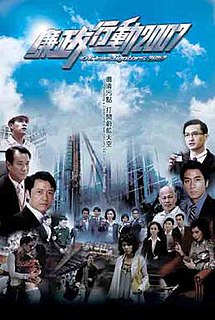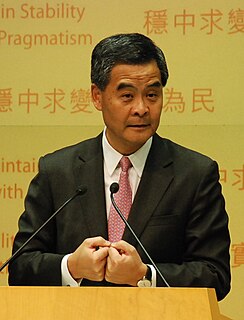
A coast guard or coastguard is a maritime security organization of a particular country. The term embraces wide range of responsibilities in different countries, from being a heavily armed military force with customs and security duties to being a volunteer organization tasked with search and rescue without law enforcement authority. A typical coast guard's functions are distinct from those of the navy and the transit police.

The Independent Commission Against Corruption (ICAC) of Hong Kong was established by Governor Sir Murray MacLehose on 15 February 1974, when Hong Kong was under British rule. Its main aim was to clean up endemic corruption in the many departments of the Hong Kong Government through law enforcement, prevention and community education.
Witness protection is security provided to a threatened person providing testimonial evidence to the justice system, including defendants and other clients, before, during, and after a trial, usually by police. While a witness may only require protection until the conclusion of a trial, some witnesses are provided with a new identity and may live out the rest of their lives under government protection.

The Hong Kong Police Force (HKPF) is the primary law enforcement, investigation agency, and largest disciplined service under the Security Bureau of Hong Kong. It was established by the British Hong Kong government on 1 May 1844. The 'Royal' title was bestowed upon the HKPF for their efforts in quelling communist riots in 1967. The Royal Hong Kong Police Force (RHKP) reverted to its former name after the transfer of sovereignty of Hong Kong from the United Kingdom to People's Republic of China.

The Customs and Excise Department (C&ED) is a government agency responsible for the protection of the Hong Kong Special Administrative Region against smuggling; the protection and collection of revenue on dutiable goods on behalf of the Hong Kong Government; the detection and deterrence of drug trafficking and abuse of controlled drugs; the protection of intellectual property rights; the protection of consumer interests; and the protection and facilitation of legitimate trade and upholding Hong Kong's trading integrity.
The Commissioner of the Independent Commission Against Corruption heads the body that is responsible for investigating and prosecuting corruption in both the public and private realms in Hong Kong. The ICAC was created in 1974 to deal with the corruption then endemic in Hong Kong's government departments and disciplined services.

Human rights protection is enshrined in the Basic Law and its Bill of Rights Ordinance (Cap.383). By virtue of the Bill of Rights Ordinance and Basic Law Article 39, the International Covenant on Civil and Political Rights (ICCPR) is put into effect in Hong Kong. Any legislation that is inconsistent with the Basic Law can be set aside by the courts.

The Commission Against Corruption is an official body of Macau responsible for the prevention, investigation and (probably) prosecution of corrupt activities.

A border guard of a country is a national security agency that performs border security, i.e., enforces the security of the country's national borders. Some of the national border guard agencies also perform coast guard and rescue service duties.

Law enforcement in Malaysia is performed by numerous law enforcement agencies and generally comes under the direct purview of the Royal Malaysia Police, the main government agency entrusted with the maintenance of law and order in the country. Like many federal nations, the nature of the Constitution of Malaysia mandates law and order as a subject of the state, therefore the bulk of the policing lies with the respective states and territories of Malaysia.

The Office of Ombudsman is a Hong Kong statutory authority, established in 1989, charged with ensuring that Hong Kong is served by a fair and efficient public administration that is committed to accountable, openness and quality of services. It operates mainly by investigating and giving recommendations to government departments.
Subjected to legal regulations, the Hong Kong Disciplined Services are made up of the following:-

Airport police units are a security police agency assigned to perform law enforcement functions at airports. They provide a wide range of law enforcement duties and responsibilities including patrol, investigation, traffic flow management, and control and response to airport emergencies. Airport police provide enhanced safety to airport employees, and to passengers. Officers can be found at security gates, throughout the terminal area, and around the airport’s perimeter.

ICAC Investigators 2007 is the 2007 installment of the ICAC Investigator series, produced by Hong Kong Independent Commission Against Corruption (ICAC) and RTHK. It is broadcast on TVB Jade channel. Each criminal case is based on actual cases investigated by the ICAC.

The Equal Opportunities Commission (EOC) is a statutory body responsible for implementing the Sex, Race, Disability, and Family Status Discrimination Ordinances in Hong Kong. The Commission was established in 1996 as an independent body to investigate complaints, facilitate mediation and take legal action against offenders.
A special constable or special police constable is generally an auxiliary or part-time law enforcement officer.

ICAC Investigators 2014 is the 2014 edition of the ICAC Investigator series, produced by Independent Commission Against Corruption (ICAC) and broadcast on TVB. Each criminal case is based on actual cases investigated by the ICAC.

ICAC Investigators 1998 is a 1998 Hong Kong television crime drama miniseries co-produced by Television Broadcasts Limited and the Independent Commission Against Corruption of Hong Kong. It is the ninth installment of the ICAC Investigators series with Ti Lung being the only actor to reprise his role from the previous installment, ICAC Investigators 1996. The series was released to celebrate the 25th anniversary of the establishment of the ICAC.

In October 2014, it was reported that Leung Chun-ying, Chief Executive of Hong Kong, had signed an agreement in 2011 with UGL Limited, an Australian engineering firm, in relation to its takeover of DTZ Holdings, a UK-listed real estate services company in which Leung was the director of the company. In agreement, UGL undertook to pay Leung £4 million in two instalments in 2012 and 2013 respectively, subject to specific conditions. As these payments concurred with the term of office of Leung Chun-ying as Chief Executive between 2012 and 2017, it has aroused concerns of the public in respect of the nature of payment, potential conflict of interests, relevant systems of declaration of interests and taxation implications.
The Director of Public Prosecutions of Hong Kong (DPP) is a Law Officer and head of the Prosecutions Division of the Department of Justice; the Director is responsible for directing the conduct of trials and appeals on behalf of Hong Kong, providing legal advice to law enforcement agencies, exercising the discretion of whether to institute criminal proceedings, and providing advice to others in government on proposed changes to the criminal law.















